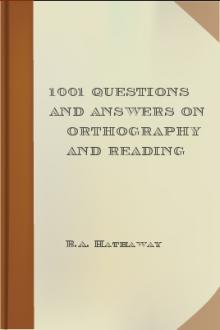Big Dummy's Guide To The Internet - Electronic Frontier Foundation (reading rainbow books .txt) 📗

- Author: Electronic Frontier Foundation
- Performer: 1428042873
Book online «Big Dummy's Guide To The Internet - Electronic Frontier Foundation (reading rainbow books .txt) 📗». Author Electronic Frontier Foundation
those languages with students from Quebec and German).
There are also conferences aimed at teachers of specific
subjects, from physical education to physics. The K12
network still has limited distribution, so ask your
system administrator if your system carries it.
Kidsphere: Kidsphere is a mailing list for elementary and secondary
teachers, who use it to arrange joint projects and
discuss educational telecommunications. You will find
news of new software, lists of sites from which you can
get computer-graphics pictures from various NASA
satellites and probes and other news of interest to
modem-using teachers.
To subscribe, send a request by e-mail to kidsphere-
request@vms.cis.pitt.edu or joinkids@vms.cis.pitt.edu and
you will start receiving messages within a couple of
days.
To contribute to the discussion, send messages to
kidsphere@vms.cis.pitt.edu.
KIDS is a spin-off of KIDSPHERE just for students
who want to contact students. To subscribe, send a
request to joinkids@vms.cis.pitt.edu, as above. To
contribute, send messages to kids@vms.cist.pitt.edu.
Knoxville Using the newspaper in the electronic classroom. This
News- gopher site lets students and teachers connect to
Sentinel the newspaper, and provides resources for them derived
Online from the newsroom. Use gopher to connect to
gopher.opup.org
MicroMUSE This is an online, futuristic city, built entirely by
participants (see chapter 11 for information on MUSEs
and MUDs in general). Hundreds of students from all
over have participated in this educational exercise,
coordinated by MIT. Telnet to michael.ai.mit.edu.
Log on as guest and then follow the prompts for more
information.
NASA Spacelink: This system, run by NASA in Huntsville, Ala.,
provides all sorts of reports and data about NASA, its
history and its various missions, past and present.
Telnet spacelink.msfc.nasa.gov or 128.158.13.250.
When you connect, you’ll be given an overview of the
system and asked to register. The system maintains a
large file library of GIF-format space graphics, but note
that you can’t download these through telnet. If you want
to, you have to dial the system directly, at (205) 895-
0028. Many can be obtained through ftp from
ames.arc.nasa.gov, however.
Newton: Run by the Argonne National Laboratory, it offers
conferences for teachers and students, including one
called “Ask a Scientist.”
Telnet: newton.dep.anl.gov.
Log in as: cocotext
You’ll be asked to provide your name and address. When
you get the main menu, hit 4 for the various conferences.
The “Ask a Scientist” category lets you ask questions of
scientists in fields from biology to earth science.
Other categories let you discuss teaching, sports and
computer networks.
OERI: The U.S. Department of Education’s Office of Educational
Resources and Improvement runs a gopher system that
provides numerous educational resources, information and
statistics for teachers. Use gopher to connect to
gopher.ed.gov.
Spacemet Forum: If your system doesn’t carry the K12 conferences, but
does provide you with telnet, you can reach the
conferences through SpaceMet Forum, a bulletin-board
system aimed at teachers and students that is run by the
physics and astronomy department at the University of
Massachusetts at Amherst.
Telnet: spacemet.phast.umass.edu.
When you connect, hit escape once, after which you’ll be
asked to log on. Like K12Net, SpaceMet Forum began as a
Fidonet system, but has since grown much larger. Mort
and Helen Sternheim, professors at the university,
started SpaceMet as a one-line bulletin-board system
several years ago to help bolster middle-school science
education in nearby towns.
In addition to the K12 conferences, SpaceMet carries
numerous educationally oriented conferences. It also has
a large file library of interest to educators and
students, but be aware that getting files to your site
could be difficult and maybe even impossible. Unlike
most other Internet sites, Spacemet does not use an ftp
interface. The Sternheims say ZMODEM sometimes works over
the network, but don’t count on it.
12.3 USENET AND BITNET IN THE CLASSROOM
There are numerous Usenet newsgroups of potential interest to
teachers and students.
As you might expect, many are of a scientific bent. You can find
these by typing l sci. in rn or using nngrep sci. for nn. There are now
close to 40, with subjects ranging from archaeology to economics (the
“dismal science,” remember?) to astronomy to nanotechnology (the
construction of microscopically small machines).
One thing students will quickly learn from many of these groups:
science is not just dull, boring facts. Science is argument and standing
your ground and making your case. The Usenet sci. groups encourage
critical thinking.
Beyond science, social-studies and history classes can keep busy
learning about other countries, through the soc.culture newsgroups.
Most of these newsgroups originated as ways for expatriates of a
given country to keep in touch with their homeland and its culture. In
times of crisis, however, these groups often become places to
disseminate information from or into the country and to discuss what is
happening. From Afghanistan to Yugoslavia, close to 50 countries are
now represented on Usenet. To see which groups are available, use l
soc.culture. in rn or nngrep soc.culture. for nn.
Several “talk” newsgroups provide additional topical discussions,
but teachers should screen them first before recommending them to
students. They range from talk.abortion and talk.politics.guns to
talk.politics.space and talk.environment.
One caveat: Teachers might want to peruse particular newsgroups
before setting their students loose in them. Some have higher levels of
flaming and blather than others.
There are also a number of Bitnet discussion groups of potential
interest to students and teachers. See Chapter 5 for information on
finding and subscribing to Bitnet discussion groups. Some with an
educational orientation include:
biopi-l ksuvm.bitnet Secondary biology education
chemed-l uwf.bitnet Chemistry education
dts-l iubvm.bitnet The Dead Teacher’s Society list
phys-l uwf.bitnet Discussions for physics teachers
physhare psuvm.bitnet Where physics teachers share resources
scimath-l psuvm.bitnet Science and math education
To get a list of ftp sites that carry astronomical images in the GIF
graphics format, use ftp to connect to nic.funet.fi. Switch to the
/pub/astro/general directory and get the file astroftp.txt. Among the
sites listed is ames.arc.nasa.gov, which carries images taken by the
Voyager and Galileo probes, among other pictures.
CHAPTER 13: Business on the Net
13.1 SETTING UP SHOP
Back in olden days, oh, before 1990 or so, there were no markets in
the virtual community — if you wanted to buy a book, you still had to
jump in your car and drive to the nearest bookstore.
This was because in those days, the Net consisted mainly of a series
of government-funded networks on which explicit commercial activity was
forbidden. Today, much of the Net is run by private companies, which
generally have no such restrictions, and a number of companies have begun
experimenting with online “shops” or other services. Many of these shops
are run by booksellers, while the services range from delivery of indexed
copies of federal documents to an online newsstand that hopes to entice
you to subscribe to any of several publications (of the printed on paper
variety). A number of companies also use Usenet newsgroups (in the biz
hierarchy) to distribute press releases and product information.
Still, commercial activity on the remains far below that found on
other networks, such as CompuServe, with its Electronic Mall, or Prodigy,
with its advertisements on almost every screen. In part that’s because
of the newness and complexity of the Internet as a commercial medium. In
part, however, that is because of security concerns. Companies worry
about such issues as crackers getting into their system over the network,
and many people do not like the idea of sending a credit-card number via
the Internet (an e-mail message could be routed through several sites to
get to its destination). These concerns could disappear as Net users
turn to such means as message encryption and “digital signatures.” In the
meantime, however, businesses on the Net can still consider themselves
something of Internet pioneers.
A couple of public-access sites and a regional network have set up
“marketplaces” for online businesses.
The World in Brookline, Mass., currently rents “space” to several
bookstores and computer-programming firms, as well as an “adult toy
shop.” To browse their offerings, use gopher to connect to
world.std.com
At the main menu, select “Shops on the World.”
Msen in Ann Arbor provides its “Msen Marketplace,” where you’ll find
a travel agency and an “Online Career Center” offering help-wanted ads
from across the country. Msen also provides an “Internet Business
Pages,” an online directory of companies seeking to reach the Internet
community. You can reach Msen through gopher at
gopher.msen.com
At the main menu, select “Msen Marketplace.”
The Nova Scotia Technology Network runs a “Cybermarket” on its
gopher service at
nstn.ns.ca
There, you’ll find an online bookstore that lets you order books through
e-mail (to which you’ll have to trust your credit-card number) and a
similar “virtual record store.’’ Both let you search their wares by
keyword or by browsing through catalogs.
Other online businesses include:
AnyWare Associates This Boston company runs an Internet-to-fax
gateway that lets you send fax message anywhere
in the world via the Internet (for a fee, of
course). For more information, write
sales@awa.com
Bookstacks Unlimited This Cleveland bookstore offers a keyword-
searchable database of thousands of books for
sale. Telnet:
books.com
Counterpoint Publishing Based in Cambridge, Mass., this company’s main
Internet product is indexed versions of federal
journals, including the Federal Register (a daily
compendium of government contracts, proposed
regulations and the like). Internet users can
browse through recent copies, but complete access
will run several thousand dollars a year. Use
gopher to connect to
enews.com
and select “Counterpoint Publishing”
Dialog The national database company can be reached
through telnet at
dialog.com
To log on, however, you will have first had to
set up a Dialog account.
Dow Jones News A wire service run by the information company
Retrieval that owns the Wall Street Journal. Available
via telnet at
djnr.dowjones.com
As with





Comments (0)